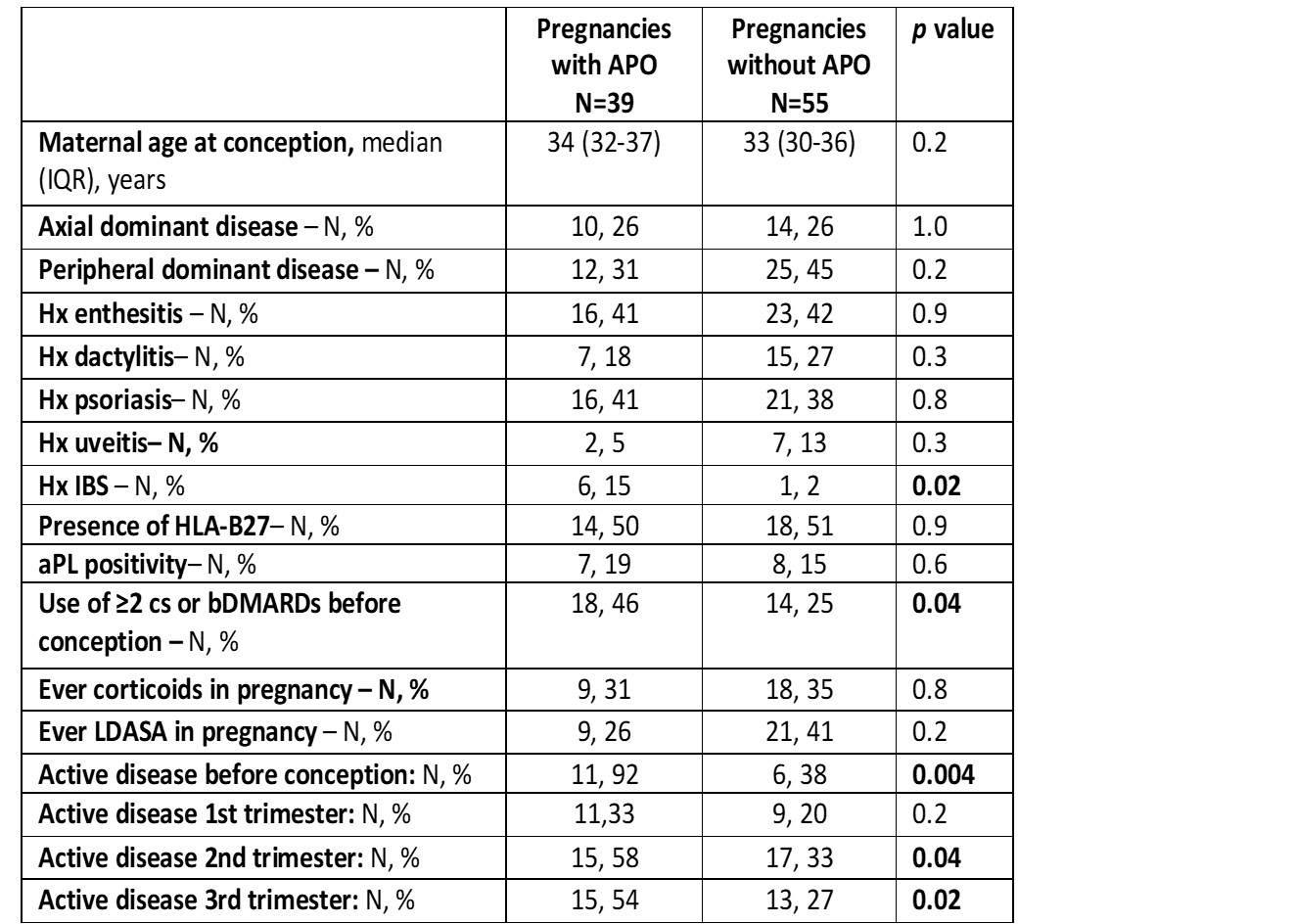Session Information
Date: Sunday, November 8, 2020
Session Type: Poster Session C
Session Time: 9:00AM-11:00AM
Background/Purpose: Women with Spondyloarthritis (SpA) seem at increased risk for adverse pregnancy outcomes (APO), however limited data have been published so far. The aim of this work was to assess pregnancy outcomes and to identify risk factors for APO in SpA pregnancies managed at two high-risk european pregnancy clinics.
Methods: Data on SpA pregnancies prospectively-followed in two centers between 2009-2019 were retrospectively analysed. Pregnancies complicated by APO were compared with uneventful pregnancies for demographic and clinical variables. Active disease was defined as a DAS-28-CRP >3.2 or an ASDAS-CRP > 2.1 according to peripheral or axial dominant disease, respectively.
Results: Ninety-four pregnancies in 82 patients (median age at conception 33 years, IQR 31-37) were analysed: 45 psoriatic arthritis, 23 axial SpA, 18 undifferentiated SpA, 5 enteropathic SpA, 2 reactive arthritis and 1 enthesitis-related juvenile idiopathic arthritis. APO occurred in 39 (41%) pregnancies: 7 (7%) early miscarriages; 6 (7%) preterm births (one < 34 gestational week; four for preterm premature rupture of membranes (PROM)); 2 (2%) PROM; 5 (5%) foetal growth restriction; 2 (2%) malformations – 1 central nervous system malformation leading to medical abortion, 1 case of oesophageal atresia; 14 (17%) small for gestational (SGA) new-borns; and 7 (7%) gestational diabetes. History of inflammatory bowel symptoms (IBS) (p=0.02) and an active disease before conception (OR: 18.3, 1.9-179.9) or during pregnancy (namely at the 2nd and 3rd trimester – OR: 2.7 CI: 1.0-7.2 and OR: 3.2 CI: 1.2-8.5, respectively) were associated with an increased risk for APO (Table 1). Likewise, APO occurred more frequently if a previous use of ≥2 conventional or biological DMARDs (OR: 2.5 CI: 1.05-6.02), suggesting a more aggressive disease phenotype. Although not significant, patients with APO were less often treated with low-dose acetylsalicylic acid (LDASA) during pregnancy. No differences were found regarding maternal age, use of corticosteroids or anti-phospholipid positivity.
Conclusion: The birth of SGA infants was the most frequent APO. History of IBS, a more aggressive disease phenotype and an active disease before conception or during pregnancy increased the risk for APO. Larger studies are warranted to confirm these data and to assess the potential protective role of LDASA.
 Table 1 – Differences between patients with and without APO. aPL – antiphospholipid antibodies; APO – adverse pregnancy outcomes; b – biologic; cs – conventional synthetic; DMARDs – disease-modifying anti-rheumatic drugs; Hx – history of; IBS – inflammatory bowel symptoms; LDASA – low-dose acetylsalicylic acid.
Table 1 – Differences between patients with and without APO. aPL – antiphospholipid antibodies; APO – adverse pregnancy outcomes; b – biologic; cs – conventional synthetic; DMARDs – disease-modifying anti-rheumatic drugs; Hx – history of; IBS – inflammatory bowel symptoms; LDASA – low-dose acetylsalicylic acid.
To cite this abstract in AMA style:
Cruz-Machado A, Crisafulli F, Barreira S, Martins P, Gerardi M, Filippini M, Fredi M, Gorla R, Lazzaroni M, Nalli C, Taglietti M, Lojacono A, Zatti S, Centeno M, Araújo C, Pinto L, Franceschini F, Tincani A, Capela S, Andreoli L. Risk Factors for Adverse Pregnancy Outcomes in Women with Spondyloarthritis: An Observational Study from Two European Multidisciplinary Pregnancy Clinics [abstract]. Arthritis Rheumatol. 2020; 72 (suppl 10). https://acrabstracts.org/abstract/risk-factors-for-adverse-pregnancy-outcomes-in-women-with-spondyloarthritis-an-observational-study-from-two-european-multidisciplinary-pregnancy-clinics/. Accessed .« Back to ACR Convergence 2020
ACR Meeting Abstracts - https://acrabstracts.org/abstract/risk-factors-for-adverse-pregnancy-outcomes-in-women-with-spondyloarthritis-an-observational-study-from-two-european-multidisciplinary-pregnancy-clinics/
